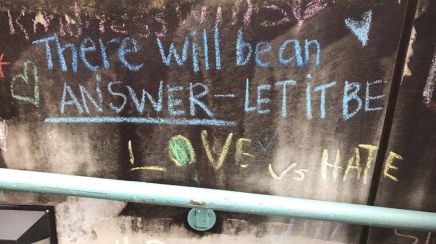August 3, 2018
I’m pro-radicalization. I want to radicalize people to be critical of power structures and constructs. I want them to ask questions about government, gender, guns, and Genesis. I want them to dig deep and talk to people outside of their comfort zone. I want them to show up on the front line. I want to admit that they can be well-meaning but wrong.
The latest buzzword in my academic field is CVE – Countering Violent Extremism. It basically represents a constellation of various strategies to prevent people from becoming violent religious and right-wing extremists. (I can already hear right-wingers asking, “But what about violent left-wing extremists?” To which I would say, “Touché.”) It is inherently of value to people like myself working to reduce hate crimes. My first exposure to this work was this spring when I was flown to the Middle East to participate in a United Nations/Haditha program to explore the role of gender in CVE.
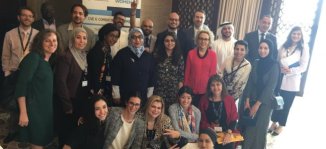
In those three days, I heard zero about surveillance or government programs to profile Muslims. I heard from ex-jihadists and ex-skinheads and people working in community-based groups to rescue teenage girls who thought running away to Syria to become a bride of an ISIS fighter seemed kinda cool and rebellious. I was honored to be in their company to talk about the my research on the role toxic masculinity plays in right-wing extremism.
So when I got an invite from the U.S. Embassy to be a part of a “CVE Community Leaders Exchange” in the United Kingdom, I didn’t hesitate to say yes. I had presented on confronting hate crimes to the British delegation when they visited Portland earlier this year and now ten of us, from Portland and Seattle, would be on a ten day trip to talk to community agencies in Luton, London, and Leeds, England. (Why didn’t we get to go to Liverpool?) The Portland delegation was four folks who work for the city, including a police captain who heads the youth service division, and me, representing the Coalition Against Hate Crimes. The Seattle delegation had a similar mix of city officials and community advocates. The trip, organized by a non-profit called Cultural Vistas, would allow us a chance to observe important community work on the issue.
To be clear, I think most of the people in our group had no interest in “CVE” anything, and were motivated by learning how community groups help young people. As a criminologist, this was my connection to the whole thing.
Off to the UK
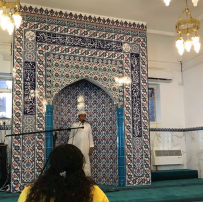
Our first stop was three days in Luton, England. Luton had been a hotbed of activity for the right-wing, anti-Muslim English Defense League (EDL), as well as Al-Muhairoun (ALM), the Islamacist group that had been linked to several terror incidents including last summer’s attack on the London Bridge. We spent our days talking to people who are working to divert youth from this type of extremism. This included teachers at the Al-Hikmah School and Mosque, and youth intervention workers, and Carnival mask makers, scholars studying right-wing nationalism, and a group called the Luton Tigers who gets kids on the football pitch as an alternative to radicalization. The young imam at Al-Hikmah explained that the best way to strengthen their Muslim faith was to clarify the teachings of the Koran, which are in direct opposition to the call for violence.
What I learned right off the bat was that all this work was done by committed community leaders desperately working to help young people make the most of their lives instead of becoming Nazis or jihadists. Instead of talking, these people were doing. Unlike their critics, they were actually working with those most at risk. I didn’t see one single covert government plot unfolding or double agent spying for MI5. I just saw motivated people putting their shoulder to the wheel.
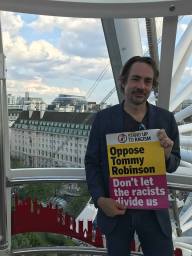
Then we headed down to London where I slipped off to a “Free Tommy Robinson” rally in front of Scotland Yard. Robinson is the nationalist leader of the EDL who was jailed for contempt of court. The small crowd of rabid older white blokes (many in Trump hats) wanted their Islamaphobic leader released and, briefly, set on me for holding an anti-Nazi sign. It was a reminder of how important this work was as a British member of parliament had been stabbed to death by one of Robinson’s followers, while he shouted, “Britain first!” (And five police officers were attacked at the rally I attended, making it all even more dire.)
While in London, we had a long morning in the basement of the Home Office (essentially the UK’s Department of Justice) learning about modifications to the Prevent program, Britain’s primary CVE program. The initial rollout went all kinds of sideways, with some horror stories of Muslim kids being wrongly profiled and thrown onto “Terrorists!” watch lists. We got the government line on the attempt to overcome the “toxic” branding of the program with a more bottom up, community-based model, which is what we witnessed in the field. Maybe it was the English accents, but it felt a little bit like we were sequestered in the inner sanctum of the Orwell’s Ministry of Information, so we asked the hard questions about CVE and civil liberties.
What we heard in Luton, London, and Leeds, was that when you asked critics of the Prevent program what should be done to divert youth from violent extremism, their answers were exactly what Prevent was doing in 2018. There was just an awareness gap. The program needed a PR campaign, said we Americans who know the value of a good advertising budget.
After our morning at the Home Office we had another community meeting at the new U.S. Embassy building, followed by a reception. Other than having to walk past a giant grinning photo of Donald Trump (who was having his secret meeting with Vladimir Putin as we walked in), everyone was completely hospitable and happy to host our delegation. When I lived abroad, I was always mindful of where my embassy was just in case things got weird (or I lost my passport). It was a true thrill to be inside. We took a group photo and I posted it online. From Stone Mountain punk to American diplomat. Kinda cool.
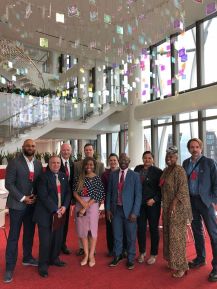
That’s when things got strange. A friend who works with the Council for American Islamic Relations (CAIR) in Portland began posting on Facebook that we were complicit in some anti-Muslim governmental “training.” It just seemed silly at the time. I had just been watching the World Cup with the Muslim founders of the Luton Tigers. My only training was in what team to cheer for after England was knocked out of the cup. (France?) There was a hysterical storm brewing back in Portland, but we continued on. Most assuredly there are folks in the Muslim community who have been burned by “CVE” efforts in the past, but it wasn’t what we were seeing at all. There seemed to be a disconnect.
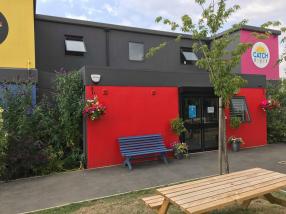
Up to Leeds, where I had last been in 1982 to see the Rolling Stones play. We did some fantastic site visits to communities that are on the front lines in the battle for souls. We visited a domestic violence shelter where a bad-ass Bangladeshi sister works to counter violent extremism by teaching men how to respect women. We went to a refugee service center where committed activists work to counter violent extremism by plugging migrants into the needed resources to build secure lives in their new home. We went to the Makkah Mosque where leaders from the local Muslim, Jewish, and Sikh communities talked about how strengthening faith networks worked to counter the pull of violent extremism. And we ended up a in a community center in the Harehills, the poorest section of Leeds, talking to a cop named Ash. Ash had, with the help of the neighborhood kids, built this center with his bare hands to create a meaningful community-based way to counter violent extremism. Four walls, two floors, plus a gym and football pitch, just from the energy of his desire to create alternatives for young people. Wow.
In none of these experience was there anything about surveillance or undermining the civil liberties of any group, especially Muslims. There was only committed community activists, including police officers and imams, who were going above the expectations of their role to give youth an alternative to become violent nationalists or jihadists.
Fake News?
So imagine my surprise when I was contacted by young journalist at a Portland weekly, the Portland Mercury, asking what was going on over there in England. The folks from CAIR had her ear and there must be some conspiracy afoot because anything associated with the government is inherently oppressive to minorities, right? I tried to let her know that our trip was nothing of the sort and was motivated by learning how to protect those communities from the rising tide of hate in America. I even sent her some boring pictures of the delegation sitting in various settings, listing to community presentations. Those pics weren’t used.

The Mercury’s piece was entitled, “City Officials Attend a Conference on Controversial Anti-Terrorism Surveillance Strategy” (with a creepy stock photo of someone doing some lurking). At first I laughed at the sophomoric reporting. There was no conference, just a series of community meetings. And, again, the issue of surveillance was never even on the table. How to get girls to play soccer and how to get boys to not join Nazi gangs were. That wasn’t headline grabbing, I guess. What Portland readers got was more hysterical knee jerking that conflated old and dealt-with criticisms of the UK’s Prevent program with Trump-era Department of Homeland Security anti-terrorism strategies. Suddenly, I was a part of Trump’s Muslim profiling thought police! And my friends at CAIR were convinced that I was either an agent of the Trump regime (Have they read this blog?) or a dupe of a massive Alex Jones-level conspiracy.
The whole charade has been deflating. It insults the efforts of those who are committed to do this work to protect youth and their communities as well as the delegation itself. I spent 10 days away from my family because I wanted find strategies to help Oregonians be safe from the wave of hate that has surged under the Trump presidency, targeting, among others, the Muslim community. The city workers and police in our delegation all had the same goal – find what works at preventing people from going down the rabbit hole of extremism and hurting (and killing) our friends and family. Certainly research must be done on what strategy is the most effective, but we saw plenty of anecdotal evidence on how small groups of people can change the world.
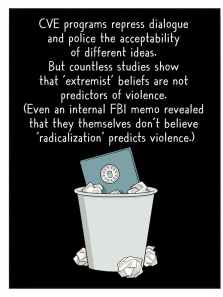
The other piece of this is locked into the binary thinking that breeds hysteria and, dare I say it, fascism. Here we have the simple good vs. evil duality. Reality is alway more complex. There is a large voice in Portland that thinks anything associated with the government is evil. All cops are evil and, I guess by extension, all equity workers for the city are evil. It requires little effort because everything drops into their binary paradigm. Just post an article from a few years ago and you’ve “proven your point.” Understanding the real world takes effort. First hand contact implies risks to challenging your perfect perspective. I can think all Trump supporters are “crazy racists.” Actually talking to them might upset what “I KNOW.” The Portland and Seattle city workers on this trip impressed me with their desire to work for social justice. And my conversations with Prevent coordinators in the UK (who were not white people, by the way) made it clear that Prevent had to make up for its past mistakes and rebuild trust with all the communities it serves. They were ready to do that heavy lifting, not from behind their laptops, but in the streets of some of the toughest streets in England.
The hysteria of the Mercury piece and those that still think we were all on some Trump secret mission threatened to affect important community relations in my city. Since the 2001 terrorist attacks, the local police bureau has engaged in numerous outreach efforts with the Muslim community and there has been a meaningful flow of good will and joint efforts to work to protect those communities. I have been a part of much of that work and it flies in the face of the “Cops suck” chant from the teenage anarchist crowd that gets so much attention. I wonder if my colleagues at CAIR have any practical ideas on how to fight extremism. I’m hoping it’s not more division between “them” and “us.” As much as I respect their work, I would inform them that there is only us.
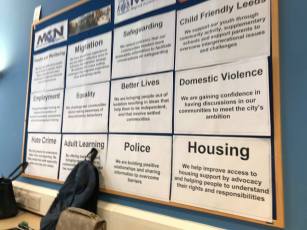
Like the local leaders I met in the UK, we will continue to strengthen those community relations, build local capacity, and help young people build the strength to resist. Resist. This resistance builds bridges, not more walls. It smashes ignorance (on all sides) with truths. We fight hate by reaching out to our critics to find a common path forward. We’re in this together.
In the end, the trip really wasn’t about “CVE,” but BCC – Building Community Capacity. I learned some good lessons that I can’t wait to share.













